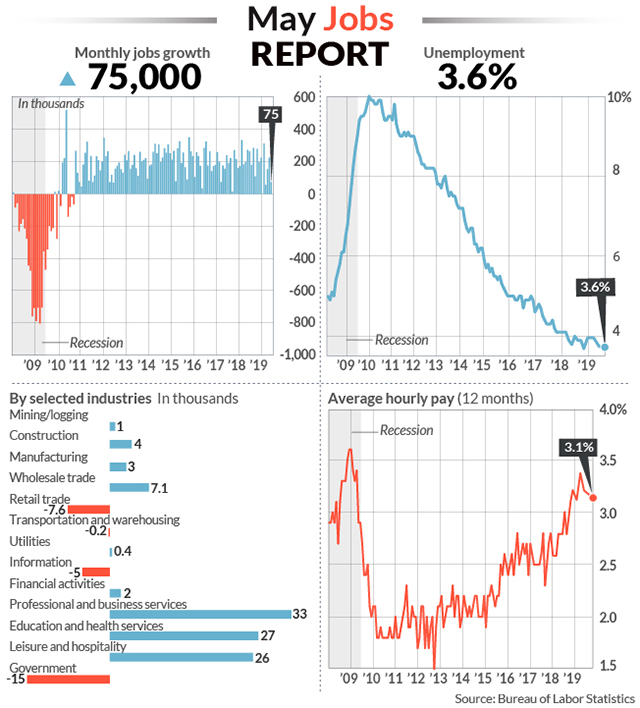
The numbers: The U.S. created just 75,000 new jobs in May and employment gains earlier in the spring were scaled back, a worrisome turn that points to a slowing economy and is likely to put more pressure on the Federal Reserve to cut interest rates.
The meager gains in May fell far short of the 185,000 MarketWatch forecast, but stocks rose in Friday trades on the assumption that the central bank might act soon. The Dow Jones Industrial Average DJIA, +1.02% jumped 263 points and the S&P 500 SPX, +1.05% also rose. The yield on the 10-year Treasury yield TMUBMUSD10Y, +0.00% fell to a 21-month low of 2.06%.
Hiring slackened off in almost every key segment of the economy and employment fell in retail and government. The pace of wage growth over the past year also slowed.
Read: ‘Disappointing’ jobs report pressures Fed to act, economists say
The news was not all bad. The unemployment rate clung to a 49-year low of 3.6% and a broader measure of joblessness that includes part-time workers, known as U6, dipped to the lowest level in 19 years.
Trade tensions aside, another reason hiring may have tapered off is a growing shortage of skilled labor in the tightest labor market in decades, some economists say. Many companies complain they can’t find people to fill a large number of open jobs.
Read: Weak unions, globalization not to blame for shrinking slice of income pie for workers
What happened: Professional-oriented companies added 33,000 jobs, hotels and restaurants boosted payrolls by 26,000 and health-care providers hired 16,000 workers. These have been the three fastest-growing areas of the economy since an expansion began 10 years ago.
Employment was weak everywhere else. Construction companies hired just 4,000 new workers while retailers shed jobs for the fourth straight month. Government also cut 15,000 jobs, failing to get a boost from temporary Census hiring.
Read: Here’s another bad sign in the jobs report
Employment gains for April and March were also reduced by a combined 75,000, revised figures show.
The economy has created an average of 151,000 new jobs in the past three months, down from as high as 238,000 at the start of the year.
The slowdown in hiring and shift toward lower paying jobs in social services and hospitality appears to have put a halt to broad wage gains.
Although the average wage paid to American workers rose 6 cents to $27.83 an hour, the increase over the past 12 months slowed to 3.1% from 3.2%. It peaked at 3.4% earlier this year.
Big picture: The pace of hiring has slowed since the end of last year, and even after the poor May report, the labor market is still healthier than it’s been in several decades.
Still, the economy appears to have been shaken by festering trade tensions with China and a slowdown in the key manufacturing sector. If the labor market or other indicators shows further weakness, the Fed would almost certainly cut interest rates to help shore up the economy.
Read: Economy grew at ‘moderate pace’ in late spring, more upbeat Fed Beige Book finds
What they are saying?: “If the Fed wants evidence the trade dispute has rattled business confidence enough to cause economic problems,” chief economist Chris Low of FTN Financial wrote, weak job gains in May and “fading wage pressures should do the trick.”
“The cracks that had been showing in other data on the economy became very apparent in the May jobs data. Unemployment held steady at 3.6% — still near a half-century low — but job creation stalled,” said Jim Baird, chief investor officer at Plante Moran Financial Advisors.
“Today’s 75,000 jobs number could mark the beginning of the end of the strong jobs expansion, or it could be an outlier. We’ll have to see another couple months of jobs numbers before we can establish hiring is slowing down,” said Robert Frick, corporate economist at Navy Federal Credit Union.










Add Comment